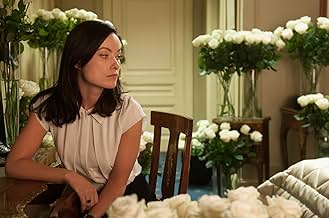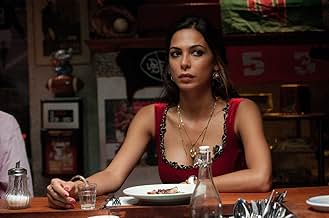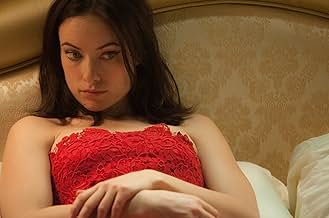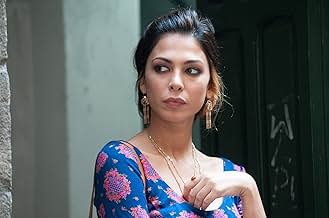VALUTAZIONE IMDb
6,3/10
29.970
LA TUA VALUTAZIONE
Tre storie d'amore che coinvolgono tre coppie in tre città: Roma, Parigi e New York.Tre storie d'amore che coinvolgono tre coppie in tre città: Roma, Parigi e New York.Tre storie d'amore che coinvolgono tre coppie in tre città: Roma, Parigi e New York.
- Regia
- Sceneggiatura
- Star
- Premi
- 1 vittoria e 1 candidatura in totale
Recensioni in evidenza
*** MAY CONTAIN SPOILERS***
Paul Haggis has a heavy burden after winning Best Picture at the Oscars with "Crash," as high expectations have soon formulated any time he creates an interwoven story. Third Person, with its stellar cast and beautiful scenery, amplifies the hype, but unlike its predecessor, it doesn't deliver.
Third Person tells three love stories, featuring unrelatable caricatures. Liam Neeson is a Pulitzer-prize winner author, who smokes cigarettes in darkness and slams his Macbook when ideas don't seamlessly flow to him (people do that?). Olivia Wilde is a charming though emotionally-detached single-in-the-city gal. Adrian Brody is an American in Rome who detests the culture yet thrives in stealing. James Franco is artist-son of wealthy New Yorkers really? The characters often lack chemistry and their development often seems forced to fill the 'love du jour' trend of love-then-fighting-then love again. The performances are uninspiring, with the exception of Mila Kunis, who plays an ex-soap opera star and single mother trying to get her life back together.
Haggis spent many years crafting this film, but he had to verbally inform the audience of many of the interwoven intricacies. The film will appeal to the New York liberal intellectual crowd who thrive on 'complex' characters, but ultimately, this movie is all sizzle, no steak.
After the TIFF movie premiere, Haggis candidly stated that for the film he had difficulty attaining financing until the last minute. Perhaps this was an omen.
Paul Haggis has a heavy burden after winning Best Picture at the Oscars with "Crash," as high expectations have soon formulated any time he creates an interwoven story. Third Person, with its stellar cast and beautiful scenery, amplifies the hype, but unlike its predecessor, it doesn't deliver.
Third Person tells three love stories, featuring unrelatable caricatures. Liam Neeson is a Pulitzer-prize winner author, who smokes cigarettes in darkness and slams his Macbook when ideas don't seamlessly flow to him (people do that?). Olivia Wilde is a charming though emotionally-detached single-in-the-city gal. Adrian Brody is an American in Rome who detests the culture yet thrives in stealing. James Franco is artist-son of wealthy New Yorkers really? The characters often lack chemistry and their development often seems forced to fill the 'love du jour' trend of love-then-fighting-then love again. The performances are uninspiring, with the exception of Mila Kunis, who plays an ex-soap opera star and single mother trying to get her life back together.
Haggis spent many years crafting this film, but he had to verbally inform the audience of many of the interwoven intricacies. The film will appeal to the New York liberal intellectual crowd who thrive on 'complex' characters, but ultimately, this movie is all sizzle, no steak.
After the TIFF movie premiere, Haggis candidly stated that for the film he had difficulty attaining financing until the last minute. Perhaps this was an omen.
This is an excellent human drama. Any of the negative reviews you see about it are basically coming from a "dumbing down" stance. Like . . (duh) WHY is this director trying to be so intellectooul?" It's a damned clever piece of work, and we don't get that much any more in this age of comic book movies.
It is also VERY moving, and finely acted. Watching Olivia Wilde's character, I kept thinking, wow such a "borderline" case, then we find out precisely WHY she's such.
You should go see this and bring your brain with you. Don't tell anyone else what it's about or what the spoilers are, and I'm not either.
"White" - the color of trust, and belief, and lies.
It is also VERY moving, and finely acted. Watching Olivia Wilde's character, I kept thinking, wow such a "borderline" case, then we find out precisely WHY she's such.
You should go see this and bring your brain with you. Don't tell anyone else what it's about or what the spoilers are, and I'm not either.
"White" - the color of trust, and belief, and lies.
When I received an invite to go to the screening of Third Person, I was a bit uncertain whether this would be a decent flick or not. I hadn't seen any trailers or read articles about it so I did not know what to expect.
Third person is a film from Paul Haggis ( the director of the Oscar- winning "Crash") involving intertwining stories featuring Liam Neeson, Olivia Wilde, Adrien Brody, Mila Kunis, James Franco, Maria Bello, Moran Atlas and Kim Basinger.
Having not seen Crash, I hadn't raised my expectations to spectacular levels. Maybe this is why Third Person is getting a mediocre score, people simply compare it with Crash and not as an individual movie.
Let me begin by stating that the atmospheric feel of the movie is top notch. Whether it is the chic, extravagant life-style in Paris, the beautiful and not-so beautiful side of Rome or the busy streets in New York, every city is portrayed in a beautiful way. The soundtrack is okay and fits with the mood of the scenes.
The acting is , how could it not be with this cast, top-notch ! Especially Mila Kunis surprised me with her emotionally depth, a side of her that we don't see a lot in her movies.
Of course, with different intertwining stories, people will argue which one is the best of the bundle. Let me make this clear : Each story is very intriguing and has plot twists that I did not see coming. You could feel everyone staring with great surprise at the screen when major twists came.
For me, the best story was the part with Adrien Brody and Moran Atlas. They had the best chemistry in the movie, with a very interesting dilemma. It had the funniest and most-thrilling moments ( according to me of course, the others are very well made as well, this is truly a matter of personal taste ).
But the movie has a big flaw. The link between the stories is rather weak ( I still have no idea how Adrien's story was linked with the rest of them, when this movie releases for all audiences someone will maybe find that link ). The wrap-around at the end was very, very confusing and didn't make a lot of sense. It was surprising , yes, but really no- one understood what the ending meant for the story. But I think that if this movie gets analyzed and someone clearly explains it's ending, my appreciation for this movie would certainly be of the roof.
I'm not the type of guy who volunteers to watch a romantic drama, I even dread the thought of watching another chick-flick/tear-buster with the girlfriend. But this drama pulled me into it's story with fantastic performances from an awesome cast, good writing/directing for each storyline and a fine balance between drama, romance and humor.
And for that great achievement, this movie deserves :
7,5 /10
Third person is a film from Paul Haggis ( the director of the Oscar- winning "Crash") involving intertwining stories featuring Liam Neeson, Olivia Wilde, Adrien Brody, Mila Kunis, James Franco, Maria Bello, Moran Atlas and Kim Basinger.
Having not seen Crash, I hadn't raised my expectations to spectacular levels. Maybe this is why Third Person is getting a mediocre score, people simply compare it with Crash and not as an individual movie.
Let me begin by stating that the atmospheric feel of the movie is top notch. Whether it is the chic, extravagant life-style in Paris, the beautiful and not-so beautiful side of Rome or the busy streets in New York, every city is portrayed in a beautiful way. The soundtrack is okay and fits with the mood of the scenes.
The acting is , how could it not be with this cast, top-notch ! Especially Mila Kunis surprised me with her emotionally depth, a side of her that we don't see a lot in her movies.
Of course, with different intertwining stories, people will argue which one is the best of the bundle. Let me make this clear : Each story is very intriguing and has plot twists that I did not see coming. You could feel everyone staring with great surprise at the screen when major twists came.
For me, the best story was the part with Adrien Brody and Moran Atlas. They had the best chemistry in the movie, with a very interesting dilemma. It had the funniest and most-thrilling moments ( according to me of course, the others are very well made as well, this is truly a matter of personal taste ).
But the movie has a big flaw. The link between the stories is rather weak ( I still have no idea how Adrien's story was linked with the rest of them, when this movie releases for all audiences someone will maybe find that link ). The wrap-around at the end was very, very confusing and didn't make a lot of sense. It was surprising , yes, but really no- one understood what the ending meant for the story. But I think that if this movie gets analyzed and someone clearly explains it's ending, my appreciation for this movie would certainly be of the roof.
I'm not the type of guy who volunteers to watch a romantic drama, I even dread the thought of watching another chick-flick/tear-buster with the girlfriend. But this drama pulled me into it's story with fantastic performances from an awesome cast, good writing/directing for each storyline and a fine balance between drama, romance and humor.
And for that great achievement, this movie deserves :
7,5 /10
Liam Neeson plays Michael, a writer. His eyes are curiously and deceptively filled with feeling and warmth even as his character plays out as a "sociopath" who has trouble feeling anything genuine toward other people. Yet, he is obsessed with the creation of emotion, as if the suspension of love in mid-air between two people is his home and friend. His mind is similarly disembodied. He feels need for love, especially when he is deprived of his lover's presence, but the actual presence of that body works to quickly diffuse the passion that is powerful in theory but thrives on it's staying in that theoretical strata. Michael has found a way, through his writing, to cope with this absurd existence. He finds the answer to his addiction in the creation of fiction using people in real life. He lets life naturally play out around him, provoking into being both the subtle and blatant forms of passion, romanticism, divine emotion and drama, then filters these experiences onto paper, choosing only the best parts, and throwing away the rest. Including any irrelevant parts of himself. In this way, he chooses to live his own life in a half-existence, desperately clinging to the divinity of love while denying the bitter absence of his ability to express it genuinely. 'Genuinely' is the key word here. Surely delivering hundreds of white roses to the bedroom of his lover Anna, (played by Olivia Wilde), is beyond romantic. But for Michael it is an act of intellect, not passion. It is a tool used to evoke the necessary catalyst, letting life display action, and funneling the magic into his own words.
Anna is a woman and entity that is completely unique in relation to anyone else in the movie and expresses a shade of mentality that I've never seen in a film so clearly. Within the life spans of each character prior to the timeline of the film is a catastrophic event involving either children or themselves as children. This is a line of storytelling that is evenly and thoroughly paved, on which it is typically easy to carry an audience. Because of such and such event in one's childhood, this character turned out to be this and this. The audience willingly nods to almost any such explanation that follows this logic; the more messed up, the more believable. Anna's case certainly gives her some degree of excusability in this story, though that concept is for another time and another debate. Incredibly, this event, though strong and controversial, does not outshine the vivid expression of her mentality through her actions prior to the unveiling of this childhood/adulthood disaster. She is blunt, cold and incredibly sadistic when it comes to attacking Michael. She is spontaneous, child-like and in considerable anguish. She is excited by the same game that Michael is, and this is what holds them together through the poisonous collisions with the sterility of every-day life. There game is fun, sexy. The fact that in their spontaneous role-play they are acutely aware of the other's true mentality builds a mutual sexual excitement; they can't wait to see how the story will turn out this time, whether it leaves Anna naked in the hallway of a hotel, or hundreds of flowers left in her empty room. The plain of existence could go on exponentially from here in satisfaction for Michael, but for Anna there is a step further down that makes her existence with Michael inhospitable. She is aware and ashamed of her acidic behavior towards Michael, and she has settled into a resolution of consistent punishment for those actions; at least she is trying very hard to. Michael makes this wish impossible in his equally consistent forgiveness for the sake of not losing his muse. As a result, Anna is catapulted into despair as she does not receive the intake of pain and rebuke she expects, resolute that she in no way deserves forgiveness or love; both of which she has long since destroyed within herself. Confronted with a room full of roses, she is helpless to respond in any way other than crawling, slowly and humbly, back to her indestructible lover...
http://funkyforestfirstcontact.wordpress.com/
Anna is a woman and entity that is completely unique in relation to anyone else in the movie and expresses a shade of mentality that I've never seen in a film so clearly. Within the life spans of each character prior to the timeline of the film is a catastrophic event involving either children or themselves as children. This is a line of storytelling that is evenly and thoroughly paved, on which it is typically easy to carry an audience. Because of such and such event in one's childhood, this character turned out to be this and this. The audience willingly nods to almost any such explanation that follows this logic; the more messed up, the more believable. Anna's case certainly gives her some degree of excusability in this story, though that concept is for another time and another debate. Incredibly, this event, though strong and controversial, does not outshine the vivid expression of her mentality through her actions prior to the unveiling of this childhood/adulthood disaster. She is blunt, cold and incredibly sadistic when it comes to attacking Michael. She is spontaneous, child-like and in considerable anguish. She is excited by the same game that Michael is, and this is what holds them together through the poisonous collisions with the sterility of every-day life. There game is fun, sexy. The fact that in their spontaneous role-play they are acutely aware of the other's true mentality builds a mutual sexual excitement; they can't wait to see how the story will turn out this time, whether it leaves Anna naked in the hallway of a hotel, or hundreds of flowers left in her empty room. The plain of existence could go on exponentially from here in satisfaction for Michael, but for Anna there is a step further down that makes her existence with Michael inhospitable. She is aware and ashamed of her acidic behavior towards Michael, and she has settled into a resolution of consistent punishment for those actions; at least she is trying very hard to. Michael makes this wish impossible in his equally consistent forgiveness for the sake of not losing his muse. As a result, Anna is catapulted into despair as she does not receive the intake of pain and rebuke she expects, resolute that she in no way deserves forgiveness or love; both of which she has long since destroyed within herself. Confronted with a room full of roses, she is helpless to respond in any way other than crawling, slowly and humbly, back to her indestructible lover...
http://funkyforestfirstcontact.wordpress.com/
10kosmasp
Paul Haggis did it again. At least for me he did. Obviously judging by the low rating, it hasn't had the same effect on others here. I really loved the movie, the intricacies, the connections and of course the "resolution". There might be a better word for the ending, but one thing is for sure: The movie demands more than one viewing. You can watch it with different eyes (your own, just a matter of speaking) and see things in a new light.
There's also trademark Haggis dialog, pointing in one direction, making fun of it, by almost straying away, than going full throttle on the first assumption you made. You may or may not like that, but it's what Haggis can do very good. And he has the actors to pull anything off, he gives them. It's a great movie with little hints here and there, that make sense in the end. Even if you don't get everything the first time around, it is a rewarding (viewing) experience
There's also trademark Haggis dialog, pointing in one direction, making fun of it, by almost straying away, than going full throttle on the first assumption you made. You may or may not like that, but it's what Haggis can do very good. And he has the actors to pull anything off, he gives them. It's a great movie with little hints here and there, that make sense in the end. Even if you don't get everything the first time around, it is a rewarding (viewing) experience
Lo sapevi?
- QuizJames Franco said that Ashton Kutcher, Mila Kunis' husband (fiancé then), couldn't endure watching the scene where Franco had to slap Kunis' face and drag her across the floor. Kutcher had to leave the room during the shooting. "I mean, it wasn't my idea!! It was the script!" Franco said. Further to the close of this scene, when dragging Kunis out across the rug, Franco's stumble at the end was unscripted: but director Haggis felt it suited the scene's intensity so left it in the final take. [Latter direction reference from director's own DVD commentary]
- BlooperWhen Olivia Wilde's character is locked out of Liam Neeson's character hotel room, she is completely naked and in such conditions she runs down the corridor and stairs towards her own room. When she enters it, she can be seen wearing knickers.
- Curiosità sui creditiThe opening as well as the first part of the ending credits share the same graphic pattern style as the lower parts of the glass partitions in the apartment of Franco's character.
- ConnessioniFeatured in Film '72: Episodio datato 12 novembre 2014 (2014)
- Colonne sonoreChiaro
Performed by Gigi D'Alessio
Courtesy of GGD Srl.
Written by Gigi D'Alessio (as Luigi D'Alessio) and Valentina D'Agostina
Published by Warner Chappell Music Italiana Srl and GGD Edizioni Srl
All Rights Administered by Warner Chappell Music Italiana Srl
I più visti
Accedi per valutare e creare un elenco di titoli salvati per ottenere consigli personalizzati
Dettagli
- Data di uscita
- Paesi di origine
- Sito ufficiale
- Lingue
- Celebre anche come
- Amores infieles
- Luoghi delle riprese
- Aziende produttrici
- Vedi altri crediti dell’azienda su IMDbPro
Botteghino
- Budget
- 28.000.000 USD (previsto)
- Lordo Stati Uniti e Canada
- 1.021.398 USD
- Fine settimana di apertura Stati Uniti e Canada
- 38.856 USD
- 22 giu 2014
- Lordo in tutto il mondo
- 2.624.761 USD
- Tempo di esecuzione2 ore 17 minuti
- Colore
- Mix di suoni
- Proporzioni
- 2.35 : 1
Contribuisci a questa pagina
Suggerisci una modifica o aggiungi i contenuti mancanti








































